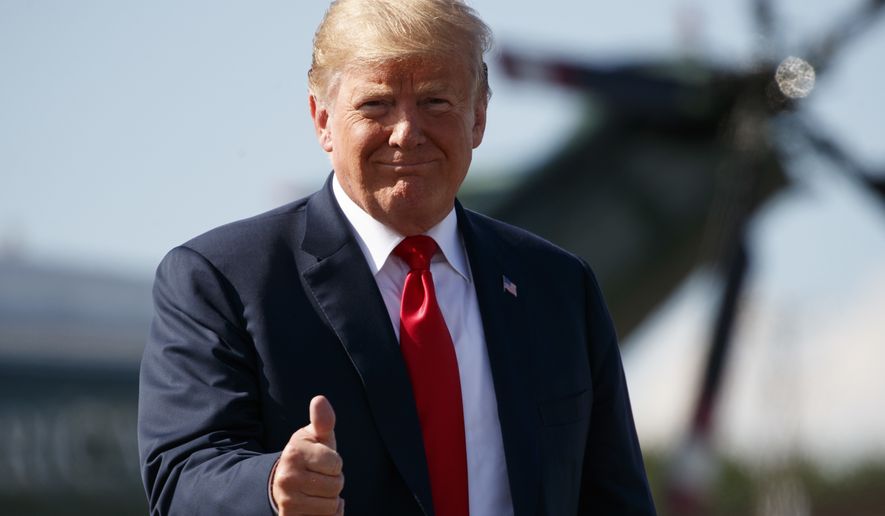President Trump’s often-criticized effort to forge better relations with Russia has morphed into a confrontational stance that this week scored economic and national security wins.
German Chancellor Angela Merkel announced that her government is backing construction of a shipping depot for importing liquefied natural gas from the U.S., bowing to Mr. Trump’s demand that she loosen Russia’s grip on the country’s energy supply.
Mr. Trump then went directly after Moscow. He announced that the U.S. was pulling out of the Intermediate-Range Nuclear Forces Treaty that for the past 31 years limited the development and deployment of missile or launch systems that can threaten Russia’s European neighbors.
The president accused Russia of violating the missile system ban for years and, to the Kremlin’s dismay, vowed to force an expensive new arms race.
Russian President Vladimir Putin was riled.
At a meeting Tuesday in Moscow with National Security Adviser John R. Bolton, Mr. Putin described the developments as “unprovoked moves that are hard to call friendly.”
SEE ALSO: NATO Secretary-General Jens Stoltenberg says nuclear buildup unlikely despite U.S. threats
He said a face-to-face meeting with Mr. Trump was in order.
Later, Mr. Trump said he is willing to sit down with Mr. Putin when the two men are in Paris next month for events marking the 100th anniversary of the end of World War I.
“It hasn’t been set up yet, but we probably will” meet, Mr. Trump said at the White House.
When he last faced off with Mr. Putin at a July summit in Helsinki, Mr. Trump was roundly criticized for being too soft and timidly accepting the Russian’s denial that his country meddled in the 2016 presidential election.
In Paris, Mr. Putin might be looking to reset the relationship.
House Foreign Affairs Committee Chairman Edward R. Royce told The Washington Times that he welcomed the advances against Russia, saying the LNG terminal would help make Germany “less vulnerable to Russian manipulation.”
SEE ALSO: John Bolton, Vladimir Putin spar on nuclear treaty fate
The California Republican backed up Mr. Trump on quitting the nuclear missile treaty.
“The Russians have been violating INF for years, making this deal unsustainable. We need durable arms control agreements,” he said.
Russia’s violations of the missile system ban go back 10 years, with allegations of cheating leveled by the Obama administration and European leaders.
Critics said that ripping up the INF would free Russia to more aggressively pursue intermediate-range nuclear weapons systems and force the U.S. to do the same as well as deploy missiles in NATO countries.
European leaders balked at Mr. Trump’s decision to quit the nuclear treaty, which aimed to soothe Cold War fears that a limited strike short of all-out global nuclear conflagration could erupt in Europe.
“The world doesn’t need a new arms race that would benefit no one and on the contrary would bring even more instability,” said Federica Mogherini, the European Union’s foreign policy chief.
Tom Karako, a national security and missile defense scholar at the Center for Strategic and International Studies, saw advantages for the U.S. in confronting Russia on energy and the missile treaty.
“To the extent that we can use energy that after all is such a core component of the Russian economy to get their attention and perhaps change their behavior, that’s a good thing,” he said.
On the INF, he said the president was adhering to Defense Secretary James Mattis’ maxim: “We must look reality in the eye and see the world as it is, not as we wish it to be.”
“It’s high time we come to recognize this pattern of Russia’s contempt for these types of arrangements, not just INF but a host of other things,” Mr. Karako said. “This is a recognition of that reality. Whether it really amounts to a win, however, depends on what comes next and to what extent we are able to shape consensus and action both here at home and secondly within the NATO alliance.”
At a campaign rally Monday in Houston, Mr. Trump described the German LNG project as an economic breakthrough and “good news for Texas.”
He said Germany “will now purchase massive amounts of LNG, which is great news for your state.” Texas is the top producer of natural gas in the U.S.
It also muscles in on Russia’s dominance of Germany’s huge energy market.
The LNG shipping terminal had been stalled because of Germany’s reluctance to snub cheap natural gas from Russia.
But the project gained traction after Mr. Trump pressured Ms. Merkel to open the energy market, including threats to sanction the planned Nord Stream 2 gas pipeline from Russia to Germany that would cement Russian dominance of the energy supply.
Germany now is co-financing the LNG terminal on the Elbe River near Hamburg with a $576 million investment.
In making the announcing to lawmakers, Ms. Merkel did not describe the change of policy as a concession but as a strategic decision, according to a Wall Street Journal report.
• S.A. Miller can be reached at smiller@washingtontimes.com.




Please read our comment policy before commenting.